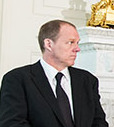Top 33 Quotes & Sayings by Brian Helgeland
Explore popular quotes and sayings by an American writer Brian Helgeland.
Last updated on April 14, 2025.
I was in a bookstore one afternoon, and I stumbled across this book called 'A Guide to Film Schools.' I always loved movies growing up and had never even conceived that it was something you could do for a living. Realizing most of them were in Los Angeles and knowing that was warm, I ended up applying.
Working on an adaptation is not as satisfying, because it's not your original work: you're interpreting. With 'L.A. Confidential,' I loved the book. In that case, I felt I was guardian of the work, staying as true to the novel as I could. I've since met the novelist, and he loves the movie and the script.
I think when I start out writing, I always try to write the version of the movie that I want to go see. I don't mean it in a way that ignores the audience, but I really set out to make a movie that I want to see and that, hopefully, other people will want to go see it. So whatever's amusing to me, I guess, I throw it all in there.






















